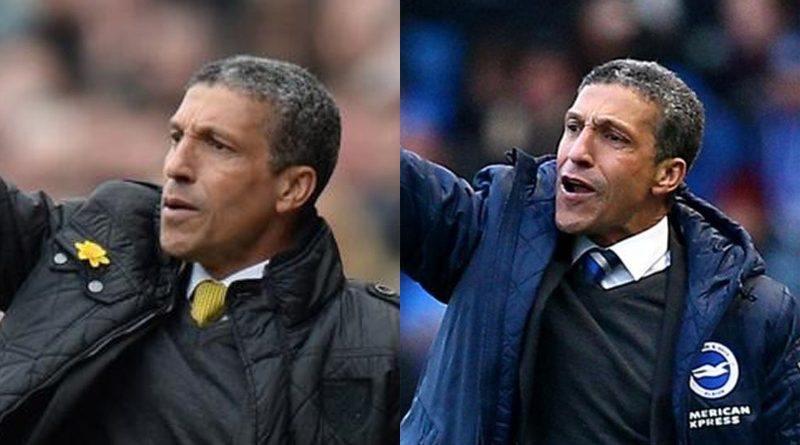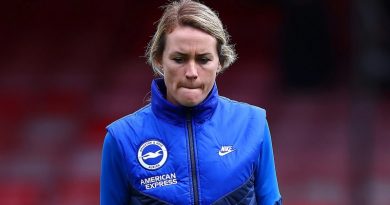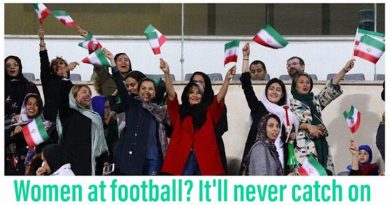The worrying signs that history is repeating itself for Chris Hughton
Negative football. Like-for-like substitutions. A steadfastness to change. Expensive forwards signed from the Netherlands who fail to fire in the Premier League. Is history repeating itself for Chris Hughton?
All the problems that ultimately led to his departure from Norwich City in April 2014 seem to be resurfacing at the Amex. Hughton was in his second season of Premier League management back then as well and, just like with the Albion, he had led Norwich to safety relatively comfortably in his first campaign.
Just how much of a comparison can be drawn between Norwich City in 2014 and Brighton and Hove Albion in 2019? Has Hughton learnt anything from the inglorious way in which his near two-year spell at Carrow Road came to an end? And where do the Albion go from here as we appear to be limping towards Premier League survival?
We spoke to Connor Southwell of TalkNorwichCity.com in a far-reaching interview about where it all went wrong for Hughton at Norwich and what lessons there might be for the Albion.
Negative football
One of the biggest bugbears that Brighton supporters seem to have with Hughton is his negative approach to games, which is best summed up by the recent record-breaking 12 hours and 15 minutes that we managed to go without a goal. Connor tells us that Norwich fans had similar complaints.
“It’s fair to say it was negative. Norwich fans struggle to recall any performances under Hughton that provoke any ounce of excitement, to be honest. It was a particular problem given that he arrived after the club was playing such vibrant, fearless and attacking football under Paul Lambert. Attempting to win games converted into trying not to lose them, with the team becoming more structured and the football being overly pragmatic.”
“Recalling the season prior to Hughton’s arrival, Norwich survived in the Premier League because of their ability to score goals and attack games. Regardless of if they were travelling to Old Trafford, the Etihad or the Emirates, they would attempt to make it difficult but, crucially, would have a go at their opponents.”
“Under Hughton, they displayed respect to almost every opponent they faced. Equally, they weren’t competent enough defensively to emphasise that side of the game and game management was non-existent. In a heavy defeat to Aston Villa in his reign, Hughton described the need to ‘consolidate’ at 3-1 down to ensure they didn’t lose by a more significant margin. They lost 4-1.”
Echoes there of the recent 5-0 home defeat to Bournemouth there in which Hughton said afterwards that he feared it could have been even worse. In comments that will also sound familiar to Brighton supporters used to seeing Glenn Murray often stationed without a blue and white shirt anywhere near him and Dale Stephens always look for a sideways pass, Connor added, “We had wingers with no licence to attack, midfielders who were conservative and focused on defensive positioning and a centre forward left isolated.”
Like-for-like substitutions
It’s very rare that you’ll see Hughton try and change a game with a substitution. His changes tend to be like-for-like and only arrive after the 60th minute. The epitome of this approach came in the Bournemouth game when, trailing 2-0 and needing a goal to get back into the game, Hughton replaced Florin Andone with Glenn Murray. Boos reigned down from across the Amex at that decision.
That chimes with Connor. “Somebody recently reminded me of a substitution he made when Norwich was trailing a game at home. As opposed to opting for replacing a defensively minded player for someone to bolster the attacking side of the game, he replaced one left back for another. No sign of injury, this was merely tactical. Funnily enough, Norwich didn’t come back in that game.”
“After Norwich, he should have learnt the lessons needed to self-improve such as making changes to influence the game, yet it appears he’s not reflected in the way some would have hoped.”
Dire away form
Whilst the Albion’s form all round at the minute is a real cause for concern, it wasn’t so long ago that the main gripe of Brighton supporters centred mainly on what was happening when he we hit the road. Hughton would always set out the Albion out to defend it’s way to a point no matter who the opponents were with very little ambition shown when away from home to actually try and win games. That’s reflected in the fact that we’ve won just five away games in the Premier League out of 37 since winning promotion. Hughton’s overall record away from home as a top flight manager makes for equally depressing reading – only 12 wins from 81.
Connor says that Norwich’s wretched form on the road was one of the contributing factors to the calls for Hughton to go. “The away home was a massive reason; it was almost as though attacking phases of play were redundant, which was bizarre considering the squad he inherited was one which, by design, was encouraged to attack and score goals. It was conservative at home, away it was uninspiring and drab. Performances were devoid of energy or excitement and away wins were a collector’s item. It was almost like that side constructed by Paul Lambert went from being allowed all the sweets to being rationed onto apples.”
Sticking with something that plainly isn’t working
Whilst Brighton’s collapse from being 12 points clear of the relegation zone to relying on Cardiff losing their final two games can be traced back to the moment Hughton moved away from 4-4-1-1 in favour of 4-3-3, Connor highlights Hughton’s refusal at Carrow Road to try anything other than the first of those formations as playing a huge part in his downfall.
“We played 4-4-1-1, with restrained wingers operating with a defensive focus in front of full backs not given a licence to attack and express themselves. Tactically, Norwich were always predictable and easy to play against. You only need to cast your eyes on the goals conceded column to witness that the defensive regime being implemented by Hughton and his staff wasn’t having the desired impact. I’d argue it was more of a lack of change, both tactically and stylistically, that cost Hughton ultimately.”
Here at least it appears as though he has learnt something from the Canaries experience. It’s easy to forget that at the time that Hughton changed from 4-4-1-1 to 4-3-3, many Albion supporters were calling for it as well. Seemingly, Hughton at Norwich would never have entertained a tactical or stylistic adjustment and he paid the ultimate price for it.
Ironically, doing the complete opposite to what cost him his job at Carrow Road might cost him his job at the Amex. The formation change has proven to be a total disaster, destabilised the team and turned us from a side who were solid defensively and could cause some problems going forward into a team who can’t defend for toffee and are lucky to have more than one shot on target per game.
What hasn’t changed is either his stubbornness or inability to acknowledge when something isn’t working. At Norwich, he refused to change at all. With Brighton, he’s made the change but then refused to reverse it when it plainly hasn’t worked for two months; despite the fact that pretty much everybody who has watched the Albion since Burnley won 3-1 at the Amex back in February has been able to see the multiple problems caused by playing 4-3-3.
Players concerns about the style of football
A delegation of senior Albion players, led by Glenn Murray, is said to have approached Hughton before the Bournemouth game and asked the manager to consider adopting a more attacking approach. He apparently refused. This isn’t the first time that Hughton’s players have been left frustrated by his conservatism either – it happened at Carrow Road as well.
“Speaking to ex-Norwich defender Leon Barnett, he talked about the difficulty the dressing room had in adapting to Hughton’s methods,” Connor tells us, adding, “Grant Holt has stated his frustration publicly, as have many others.”
Holt in fact said that it was Hughton’s negative style of football that played a part in his decision to leave Carrow Road and Premier League football in favour of dropping down to the Championship with Wigan Athletic in the summer of 2013.
Holt told the BBC, “On a matchday I wasn’t enjoying the way we were playing – we were set up more defensively. I was still enjoying being at the club but I wasn’t enjoying the tactics. If anyone had seen the way I was last season, I always try and do it on the pitch regardless, but everyone could see I wasn’t happy with the way it was going, the way the team was playing and my role in the team. I had just had enough really.”
Transfer business
Perhaps the most intriguing comparison between Hughton’s spell at Norwich and his time with the Albion comes in the transfer market. With both clubs, he has spent big money on either Dutch forwards or those who have played in the Eredivisie, none of whom have really delivered so far. For £14m Jurgen Locadia and £17m Alireza Jahanabksh at the Amex, read £8.5m Ricky van Wolfswinkel at Carrow Road.
How much say Hughton has over transfers at the Albion is up for debate, with most of the recruitment led by Paul Winstanley. Still, there are two schools of thought over Locadia and Jahanbakhsh’s struggles since arriving. The one which most of us subscribe to, including us here at WeAreBrighton.com, is that they just aren’t very good, not up to Premier League standard and that the club have effectively made two very expensive cock ups.
The second is that Locadia and Jahanbakhsh are both actually talented players – it’s just Hughton doesn’t know how to get the best out of them. Interestingly, that’s what Connor believes happened with van Wolfswinkel – and is probably happening with two of the Albion’s most expensive acquisitions.
“Van Wolfswinkel was a victim of circumstance in many ways. Hughton purchased a poacher who operated in the box and was perplexed when the Dutch striker couldn’t hold the ball up or win free kicks in the manner his style demanded.” That will no doubt have Locadia supporters nodding in agreement.
“Van Wolfswinkel was an example of recruiting foreign talent but Hughton refusing to budge from his pragmatism meant Norwich didn’t see the best of that talent. So much promise, so much money departed with and yet so little to display for it.”
“Jurgen Locadia is one who has so much promise. Another Dutch striker brought in for megabucks only to not display his best face, possibly because as I’ve mentioned, nothing has changed in terms of Hughton’s style or approach to football matches.”
“Take Alireza Jahanbakhsh, a player who was sensational at Alkmaar. Hughton’s tactics have seemingly suffocated previously productive operators. Brighton seems reliant on a moment of brilliance from Anthony Knockaert to score goals.
“It’s that lack of progression that’s frustration. Hughton feels limited in terms of what he can do, particularly in the second season after committing himself to more money which naturally leads to more expectation. He needs to recognise that being expansive is necessary. By all means, specific scenarios require a need for pragmatism, but not at home when trailing a game. That’s where the frustration towards him is born from.”
Were Norwich right to get rid of Hughton?
The big question then is were Norwich right to get rid of Hughton when they did – and what could happen to the Albion if we follow suit? When Hughton was sacked at the start of April 2014, the Canaries were five points above the relegation zone but with a horror final five games against Fulham, Liverpool, Manchester United, Chelsea and Arsenal. Under caretaker boss Neil Adams, they picked up a solitary point from the Chelsea game and ended up being relegated.
The risk in sacking a manager because he is too pragmatic is that you end up in the ‘you don’t know what you’ve got until it’s gone’ scenario that so many Premier League clubs have found themselves in. Charlton Athletic, Stoke City, Southampton and Aston Villa are just some of the names who have sacked their boss, stating their belief that the manager has taken them as far as he can, only to find themselves hurtling towards the Championship as a result.
For Connor, he believes that Hughton should have gone from Carrow Road even sooner than he did. “Hindsight probably states that Norwich gave him too much time. December should have seen Hughton fall by the sword, given they’d been decimated 7-0 by Manchester City amid a real lack of improvement or attacking impetus.”
“Hughton will always build a stable ship but struggle to get it going in an upward direction on the biggest stage. To proclaim he’s out of his depth is irresponsible but, fundamentally, his ethos doesn’t allow for alteration. Those shackles never get released.”
“He is seen as a safe pair of hands and given he took Brighton up, it’s understandable the faith the club want to show to him. However, the talent that your squad looks to possess to an outsider should enable a more aesthetic style that doesn’t compromise your position.
“Relegation is acceptable providing you see your team attack and commit everything. When they are deploying a deep block and seemingly waiting to be beaten, that’s when the irritability of his methods come into play. Norwich has been where Brighton stands currently, and that decision to stick or twist will only increase the longer he is in charge.”





There are some striking gaps in the principal argument of this piece. Furthermore, it is more than a little thin on depth of research, as no time has been taken to survey Chris Hughton’s teams performances at Newcastle and Birmingham. Most significantly, this is not the story of CH and a rigid football philosophy, it is the story of football economics and the perilous parallels of a rigid Football club operating strategy among two fairly similarly endowed clubs.
If one is to adequately judge Chris Hughtons depth as a football manager / coach, one must also take into account the style of football employed at Newcastle and at Birmingham City during his tenure, and the context of football economics at those clubs during his tenures, respectively. Newcastle were freshly relegated and still operating as if they were still a PL club, and rightly they expected to be quickly promoted. They had a big payroll, and the willingness and wherewithal to buy and offer substantial salaries for those players they wanted and who were willing to come to Newcastle. In 2009 under CH, Newcastle won 102 points, scored 90 goals from 46 games (almost 2 points per game). In 2011/12, despite the crisis of ownership very soon after CH’s appointment, Birmingham came 4th, won 76 points and scored at a rate of 1.8 goals per game.
Returning to the context of football economics. At Norwich, CH endured an almost identically restrictive wage structure as BHA today, and they were relegated very quickly after CH was let go. Moreover, they have been way off in the wilderness until this season. Does the author remember a couple of seasons ago when BHA comprehensively trashed the then table topping Norwich City team 5-0 (under Alex Neil) in the championship. Norwich subsequently folded like a cheap suit into mid table obscurity for the rest of that season. Moreover, I still think Norwich have that same soft under belly, and am sure they still operate like that and will really struggle next year. They will not compete like, for example, Wolves have done this year, or Watford a few years earlier after promotion.
Back when CH was at Norwich the top earners were on about 35-40k a week, if even that. This is back in 2013. Then, teams like Stoke and Cardiff were paying crazy wages for very average players – for example, ~ 60-65k for Peter Odimwenge and Kenwayne Jones, to name a couple. Norwich wouldn’t do it then, and BHA, 6 years later, wont do it now. Yes, Bloom and co have spent quite high transfer fees on a few players, but none of them are on anything over 45k – and even then I think only Ali J is on that. I could be wrong – based on the sources available. In sum, the strategies are very similar, and again, the author really should have taken this into account. It is really disappointing that the main source for this blog post …… This is about the economics of football and boardroom cheque-books, which could be well argued as a major determinant of a clubs footballing philosophy.
Although a generalisation, managers that were defenders in their playing days are better equipped to set a defensive strategy whilst managing. It then relies on the coaches for attacking strategies under the restrictive guidance of the manager. This has been clear for BHA since Christmas and for the last six matches in particular, it is clear, there is discord between manager and players.
Chris Hughton in my opinion must be more flexible and he MUST appreciate that at the end of the day, he and BHA are in the entertainment business. BHA have wonderful facilities and supporting fans but the latter will diminish if there is a repeat of this dire season.